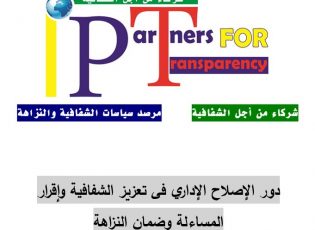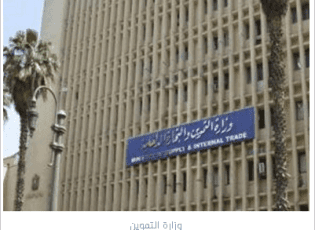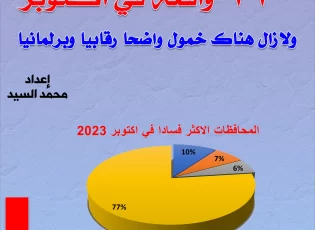The annual report to monitor the state of corruption in Egypt during 2016
968 incidents of corruption in 2016
Administrative oversight is the champion of the scene and limited parliamentary initiatives to combat corruption
Within the framework of its series entitled “Corruption Status Book,” Partners for Transparency publishes its annual report that covers the year 2016 and includes a review and analysis of legislative and procedural developments related to combating corruption, as well as the corruption incidents that were revealed during the past year and their distribution by sector and geography.
The report revealed that the year 2016 witnessed 968 incidents of corruption, and the year witnessed a recurrence of political rhetoric emphasizing the fight against corruption and a remarkable activity of the Administrative Control Authority, which revealed a large number of incidents of corruption in various sectors of the state, but 2016 did not witness meaningful legislative developments. Concrete with regard to besieging and preventing corruption despite the presence of limited parliamentary activity and initiatives to form fact-finding committees or submit proposals for laws that have not yet reached the stage of serious discussion in specific committees or public sessions.
Legislative measures related to combating corruption during 2016:
- Laws:
- November 1, 2016: The issuance of the Civil Service Law, Law No. 81 of 2016, which the government said aims to eliminate bureaucracy in government institutions and set new rules to reform the state’s administrative apparatus and eliminate favoritism by appointments by obliging the government agency to publish an advertisement for vacant jobs. The appointment is made after the applicant passes the exams, but many people see The law does not fully achieve these goals, and it is not sufficient to address the problems of the administrative apparatus and fill the gaps through which the corrupt execute, and it will remain subject to the actual implementation of the law during the next stage.
- November 16, 2016: Law No. 83 of 2016 amending some provisions of Law No. 7 of 1991 regarding some provisions related to private state property. The law aims to protect state property and prevent its seizure. The law also approved referring the designation of state lands to the competent minister, whether land reclamation or the establishment of new urban communities and the establishment of facilities Tourism and the establishment of industrial development zones. The law also clarified that the proceeds of managing, exploiting and disposing of these lands are public funds from the resources of these competent bodies. The competent minister determines the purposes for which they are allocated and the rules and procedures for disbursement from them and presents them to the Prime Minister and transfers the surplus of these funds annually to the state treasury Instead of leaving the freedom of action to the relevant bodies, the law is a good step in the direction of besieging corruption cases related to state lands.
- Decisions issued during 2016:
- March 28, 2016 President Abdel Fattah El-Sisi issued a republican decree bearing No. 132 of 2016 relieving Counselor Hisham Ahmed Fouad Janineh, head of the Central Auditing Organization, from his post based on the statement issued by the Supreme State Security Prosecution regarding the investigations it is conducting into the incident of the statements of the head of the Central Auditing Organization, regarding the cost of corruption in Egypt for the year 2015, a decision that caused controversy, the reverberations of which are still reverberating in the Egyptian reality until now, between supporters and opponents of the decision.
- August 7, 2016: President Abdel Fattah El-Sisi, President of the Republic, issued Decree No. 353 of 2016 appointing Counselor Hisham Badawi as head of the Central Auditing Organization with the rank of minister for a period of 4 years, starting from the date of the decision.
- August 31, 2016: President Abdel-Fattah El-Sisi issued a Republican Decree No. 378 of 2016 considering the recommendations of the State's Land Restoration Committee binding on all state authorities on the lands with regard to legalizing previous problems and difficulties in the field of land. The decision also stipulated that all recommendations issued to the subcommittees shall also be obligatory. After being approved by the main committee.
- November 27, 2016: The Prime Minister issued Decree No. 3009 of 2016 to form a ministerial committee to support integrity and transparency headed by the Prime Minister, and the committee included in its membership the President of the Central Auditing Organization, Counselor / Hisham Badawi, the committee is concerned with studying current work problems, and the gaps that lead to administrative corruption in government agencies and governorates that are more aware. Corruption, and conducting periodic field traffic on the various authorities to overcome all obstacles in order to provide services to citizens in more honest ways. The committee submits reports on the results of its work and its recommendations, which its head submits to the President of the Republic.
The role of regulatory agencies during 2016:
The year 2016 witnessed strong activity for the Administrative Control Authority, as the authority receives political support from the Presidency of the Republic, and clear mandates to prepare reports on national projects before its opening, and the authority has succeeded in uncovering a large group of corruption and waste of public money cases in a number of state bodies and agencies, the most famous of which was the incident. The major bribery in which some employees and officials of the Egyptian State Council are accused, and other cases involving some advisers to ministers and senior officials in the state.
In addition, the administrative prosecution carried out remarkable activity in following up and investigating a huge number of cases within the state’s administrative apparatus, and succeeded in returning huge sums of money seized by some unlawfully, in addition to its efforts to develop a proposed law to combat corruption, but it has not yet seen the light of day.
On the other hand, there was no noticeable role for the Central Auditing Organization, and its performance was very slow compared to the two bodies of administrative control and the administrative prosecution, and it seems that the agency was negatively affected by the controversy that arose in the case of its former president, Counselor Hisham Geneina, and the media clamor that accompanied the case.
Parliament's role in fighting corruption during 2016:
- February 22, 2016: MP Medhat Al-Sharif submitted a proposal to create an integrity and transparency committee, but the proposal was rejected by the Egypt Support Coalition.
- May 2016: Deputy Muhammad Abdullah Zainuddin submitted a proposal to establish an independent anti-corruption body called the “National Anti-Corruption Commission”. The proposal was rejected by the government under the pretext of its unconstitutionality and it was rejected by Parliament, while it was presented again to the Parliament's Suggestions and Complaints Committee and its discussion was postponed until Present it to the Supreme Judicial Council.
- June 20, 2016: Representative Amr El-Gohary, a member of the Parliament's Economic Affairs Committee, proposed the passage of a legislative amendment to the Tenders and Auctions Law No. 9 of 1983, which would cancel the text requiring bidders to submit two financial and one technical envelopes, and return to the “unified envelope” method to eliminate corruption in auctions and auctions.
- July 1, 2016: Dr. Ali Abdel-Al, Speaker of Parliament, announced the formation of a truth commission on corruption in wheat silos, headed by Representative Majdi Malik Maximus.
- August 29, 2016: The council secretariat discussed the report issued by the fact-finding and review committee and then sent it to the Administrative Prosecution Authority in order to initiate investigations into the case and take the necessary measures. The committee held the political responsibility for corruption on the former Minister of Supply Dr. Khaled Hanafi in addition to the public officials in the ministries of “Supply - Agriculture - Trade and Industry “In addition to the two silos companies belonging to the Ministry of Supply and the owners of supply sites in the private sector, the month of August witnessed the discovery of the largest case of corruption in wheat silos, as the committee estimated the amount of wheat supplied as a fake supply of approximately 2 million tons, which is equivalent to approximately 5.6 billion pounds. Refer documents to the Attorney General.
- October 6, 2016: MP Magdy Malak submitted a request to form a fact-finding committee to uncover corruption incidents at the Ministry of Agriculture, and signed the request of 27 other deputies, calling on Dr. Ali Abdel-Al, Speaker of Parliament, to form a fact-finding committee about the collapse of Egyptian agriculture and the waste of hundreds of billions of the nation's wealth due to corruption and mismanagement over a period of more than Over 30 years old.
- October 31, 2016: Representative "Anisa Hassouna", a member of the House of Representatives, submitted a draft law regarding the Coordinating Authority for Combating Corruption, as the memorandum indicated the necessity and quality of an independent anti-corruption body, especially after the culture of corruption was widely spread and the individual lost the viability of work after relying on hidden incomes from bribery, brokerage, commission and favoritism, while some MPs objected The proposal should justify this as interfering in the work of the regulatory agencies and imposing financial burdens on the state treasury.
Political discourse and anti-corruption:
The president's speeches during 2016 included an emphasis on combating corruption, eliminating favoritism and abuse of influence, implementing anti-corruption laws, upholding the values of accountability, transparency, and preserving public money.
- Sunday 24 January 2016: President Abdel Fattah El-Sisi stressed the fight against corruption during his speech at the commemoration of the 25th of January revolution, saying: “The Egyptian state will continue to make all necessary efforts to combat corruption and eliminate it, whether administratively or financially, to uphold the values of accountability and accountability, to preserve public funds and to ensure a safe, stable and attractive environment for investment.” .
- Wednesday 24 February 2016During his speech at the launching ceremony of the sustainable development strategy “Egypt Vision 2030,” President Abdel Fattah El-Sisi called on the government ministers to intervene in the details of the projects set up in their ministry to prevent corruption.
- Wednesday 24 February 2016: Prime Minister Sherif Ismail confirmed that Egypt's 2030 strategy aims to create an economic balance that depends on innovation, social justice and investing in human genius to improve the quality of life of Egyptians so that Egypt is among the top 30 countries in terms of combating corruption and development, vanishing the proportion of the poor and upholding human rights.
- March 19, 2016: President Abdel Fattah El-Sisi affirmed the state's will to combat corruption in all its forms, pointing to the importance of finding innovative ideas to eradicate this scourge and address the conditions that led to it.
- April 28, 2016: During the Labor Day celebration, President Abdel Fattah El-Sisi affirmed the government’s mandate to fight corruption, confront high prices, and support the role of the Consumer Protection Agency and regulatory agencies to achieve the citizen’s interest.
- April 13, 2016: During his meeting with a group of representatives of society groups, President Abdel Fattah El-Sisi called on youth, saying, "If you want to fight corruption, prepare for the local elections ... and I will not let you down."
- May 16, 2016: President Abdel Fattah El-Sisi called on the administrative control to confront favoritism and abuse of influence, and to take all legal measures against anyone who pleads with himself by exploiting the presidency to implement his own interests.
- June 2, 2016 On the sidelines of the Egyptian-Hungarian Business Forum, President Abdel Fattah El-Sisi said: “We seek to be among the top 30 countries in the world in terms of fighting corruption, market competitiveness and quality of life.
- June 3, 2016 President Abdel Fattah El-Sisi affirmed that the regulatory agencies are completely free in the face of corruption, indicating in his dialogue with the journalist Osama Kamal that the state is serious in its war against corruption in all its forms and called for confidence in the regulatory agencies.
- September 5, 2016: President Abdel Fattah El-Sisi addressed the issue of combating corruption in view of the priority it represents for Egypt during the Group of Twenty held in China. During his speech in the second working session, which discussed ways to reach more effective and efficient financial and economic governance, the President stressed the importance that efforts to implement the group's action plan include the topic Recovering the stolen money and assets that Egypt suffers in particular.
- October 16, 2016: President Abdel Fattah El-Sisi spoke about the issue of combating corruption in Egypt, stressing that the state never tolerates corruption and that he strongly supports the relevant state agencies in combating and confronting corruption, and in the second part of his dialogue with the heads of Al-Ahram, Al-Akhbar and Al-Gomhoria newspapers, he addressed a number of international, regional and local issues, and added. We are waging a relentless war on corruption to prevent and eradicate it. ”He continued:“ By the way, Egypt's position in the corruption index for the countries of the world has improved, as 8 places rose from the 96th to the 88th position, but we have to pay attention because part of the countries ’assessment comes through monitoring what He publishes and broadcasts in the media about the extent of corruption, and sometimes what is circulated is unchecked.
- October 17, 2016: Eng. Sherif Ismail, Prime Minister, stressed the need for a decisive confrontation with corruption in the localities and taking deterrent measures in accordance with the law, adding: “We will not allow projects to be suspended due to an employee’s negligence,” considering that the matter is a “betrayal of trust”, and he stressed during the meeting of the Board of Governors to be careful and preserve rights The state and the rights of citizens and investors.
- October 31, 2016: Sherif Ismail, Prime Minister, confirmed that the problems Egypt is going through are not only economic, but rather that we suffer from a crisis in administration and a large spread of corruption rates. In his speech during the plenary session of Parliament, he admitted that the government is seeking to use the armed forces to reform the system because the state’s administrative apparatus suffers from corruption. While the armed forces are more committed. He explained that the government is working on reform in 4 phases, starting from reforming the public debt index, increasing the state’s resources, in addition to working on social justice, whether in food commodities, the Takaful and Dignity program, as well as social housing. He also stressed that the government is obligated to send a unified investment law during the month of November. In addition to a bundle of other legislation.
- 12December 2016 :President Abdel Fattah El-Sisi, President of the Republic, during the speech delivered by His Excellency at the ceremony held by the Ministry of Awqaf on the occasion of the anniversary of the Prophet’s birthday, greeted the Administrative Control Authority for its efforts to combat corruption, and indicated that the state is keen to confront corruption seriously, and stressed Implementing and using the law’s mechanisms to ensure that there are no transgressions or grievances.
- December 28, 2016: President El-Sisi thanked the Administrative Control Authority during the inauguration of the fish farming project in Ismailia for the effort made during this difficult stage, and added that when we say that we will face corruption in Egypt, we were serious and believed in the necessity to make efforts to confront it.
- Statistical distribution of corruption incidents during 2016 (sectors - governorates - months) :
First: Distribution of corruption incidents according to sectors during 2016 (January 2016-December 2016)

The previous data indicate the distribution of corruption incidents according to sectors during the period from January 2016 to December 2016, which monitored 968 incidents of corruption in state institutions, as the Ministry of Supply won the largest share of corruption incidents, with 200 out of a total of 968 incidents, followed by localities with 115 incidents of corruption. Then agriculture with 99 incidents of corruption, then the Ministry of Health with 95 incidents, followed by the Ministry of Interior with 62 incidents, followed by the Ministry of Education with 58 incidents of corruption, then the Ministry of Investment with 32 incidents, then the Ministry of Communications and Information Technology with 31 incidents. Next comes the Ministry of Finance with 28 incidents, the Ministry of Housing with 27 incidents, the Ministry of Justice with 21 incidents, then the Ministry of Endowments with 20 incidents, followed by the Ministry of Transport with 19 incidents, then the Ministry of Irrigation and Water Resources with 17 incidents, then the Ministry of Petroleum There are 16 incidents, then the Ministry of Information and the Ministry of Youth and Sports come with 14 incidents of corruption for each of them, then the Ministry of Antiquities with 11 incidents, then each of the Ministry of Electricity, Social Solidarity and Higher Education comes with a score of 10 incidents for each of them, then the Ministry of Culture comes with a score of 9 Actions, then Parliament comes with 8 incidents, then unions come with 7 incidents, then regulatory agencies and the Ministry of Trade and Industry come with 6 incidents for each of them, then the Ministry of Environment comes with 5 incidents, then comes the economic authorities and the Ministry of Civil Aviation With 4 incidents for each of them, then each of the cabinet and businessmen and the Ministry of Manpower, Planning and Administrative Reform comes with a balance of only two corruption incidents, and finally, then both the Ministry of Tourism and the public business sector with a score of 1 corruption incidents out of a total of 968 incidents.
Second: Distribution of corruption incidents according to the governorates during 2016 (January 2016 - December 2016)

Cairo governorate got first place in corruption incidents with a score of 257 incidents of corruption out of a total of 968 incidents of corruption, followed by Giza governorate with a score of 116 corruption incidents, followed by Qalyubia governorate with a score of 60 corruption incidents, while Alexandria governorate got 51 corruption incidents, followed by Beheira governorate with 48 incidents. Then the governorate of Sohag comes with a score of 44 incidents, then Gharbia governorate with a score of 41 incidents of corruption, followed by the governorate of Dakahlia with a score of 39, then both of the governorates of Minya and Sharqia with a score of 37 incidents of corruption for each of them, then Menoufia governorate comes with a score of 31 incidents of corruption, then Qena governorate with a score 29 incidents of corruption, followed by Beni Suef governorate with a score of 24 incidents, then Assiut governorate recorded 23 incidents of corruption, while Fayoum governorate recorded 15 incidents of corruption, while Port Said and Kafr El Sheikh governorates got 14 incidents for each of them, then Ismailia and Aswan governorate each 13 incidents for each of them, while the Red Sea Governorate recorded 12 incidents of corruption, while the New Valley Governorate received 11 incidents of corruption, while both Suez and Luxor governorate got 10 incidents for each of them, then Damietta Governorate came with 8 incidents. Ed, while North Sinai governorate got a score of 5 incidents, then Marsa Matrouh governorate came with 4 incidents of corruption, and South Sinai came last with two out of a total of 968 corruption incidents during 2016.
Third: Monthly distribution of corruption incidents during 2016 (January 2016 - December 2016)

Previous data indicate that the monthly distribution of corruption cases indicated that January 2016 recorded the highest rate of corruption incidents with 119 incidents, then February of the same year with 108 incidents, then May with 96 incidents, followed by April with 91 incidents, followed by October with 90 Then, August comes with 77 incidents, while December recorded the lowest number of incidents with 46 incidents of corruption.










